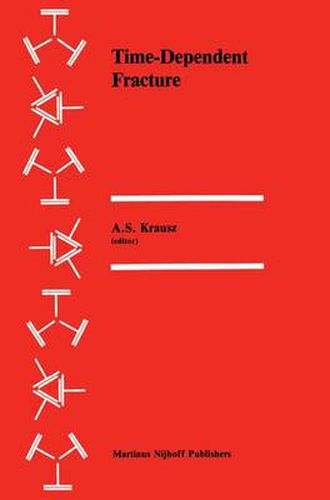Readings Newsletter
Become a Readings Member to make your shopping experience even easier.
Sign in or sign up for free!
You’re not far away from qualifying for FREE standard shipping within Australia
You’ve qualified for FREE standard shipping within Australia
The cart is loading…






This title is printed to order. This book may have been self-published. If so, we cannot guarantee the quality of the content. In the main most books will have gone through the editing process however some may not. We therefore suggest that you be aware of this before ordering this book. If in doubt check either the author or publisher’s details as we are unable to accept any returns unless they are faulty. Please contact us if you have any questions.
The understanding of time dependent crack propagation processes occupies a central place in the study of fracture. It also encompasses a wide range of conditions: failure under sustained loading in a corrosive environment, fracture under cyclic loading in non-degrading and in corrosive environment, and rupture at high temperature. This list covers probably 90% of the failures that occur in engineering practice. The process of time dependent fracture is controlled by the physics of atomic interaction changes; it is strongly influenced by the micro structure; and affected by the interaction of the material with the mechanical (load, displacement), the thermal (temperature), and the chemical or radiation environment. To be able to control crack propagation the development of testing methods and the understanding of the industrial environment is essential. The conference was organized in this context. A call was issued for contributions to the following topics. THERMAL ACTIVATION. Theoretical papers dealing with the modification of fracture mechanics to accommodate thermally activated processes. TIME DEPENDENT MICRO-PROCESSES. Presentations covering both the theoretical and observational aspects of creep and fatigue damage in materials whose microstructures may exert a significant influence on crack growth. INDUSTRIAL APPLICATIONS. Submissions describing the practical application of fracture mechanics and damage tolerance analysis to the determination of useful operating lives. x ENVIRONMENTAL EFFECTS. Papers dealing with engineering materials and/or components exposed to aggressive environments, with and without temperature effects. The response was gratifying. Leading experts responded; the organizers of the conference are grateful for the large number of excellent contributions.
$9.00 standard shipping within Australia
FREE standard shipping within Australia for orders over $100.00
Express & International shipping calculated at checkout
This title is printed to order. This book may have been self-published. If so, we cannot guarantee the quality of the content. In the main most books will have gone through the editing process however some may not. We therefore suggest that you be aware of this before ordering this book. If in doubt check either the author or publisher’s details as we are unable to accept any returns unless they are faulty. Please contact us if you have any questions.
The understanding of time dependent crack propagation processes occupies a central place in the study of fracture. It also encompasses a wide range of conditions: failure under sustained loading in a corrosive environment, fracture under cyclic loading in non-degrading and in corrosive environment, and rupture at high temperature. This list covers probably 90% of the failures that occur in engineering practice. The process of time dependent fracture is controlled by the physics of atomic interaction changes; it is strongly influenced by the micro structure; and affected by the interaction of the material with the mechanical (load, displacement), the thermal (temperature), and the chemical or radiation environment. To be able to control crack propagation the development of testing methods and the understanding of the industrial environment is essential. The conference was organized in this context. A call was issued for contributions to the following topics. THERMAL ACTIVATION. Theoretical papers dealing with the modification of fracture mechanics to accommodate thermally activated processes. TIME DEPENDENT MICRO-PROCESSES. Presentations covering both the theoretical and observational aspects of creep and fatigue damage in materials whose microstructures may exert a significant influence on crack growth. INDUSTRIAL APPLICATIONS. Submissions describing the practical application of fracture mechanics and damage tolerance analysis to the determination of useful operating lives. x ENVIRONMENTAL EFFECTS. Papers dealing with engineering materials and/or components exposed to aggressive environments, with and without temperature effects. The response was gratifying. Leading experts responded; the organizers of the conference are grateful for the large number of excellent contributions.